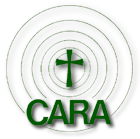CARA is a national, non-profit, Georgetown University affiliated research center that conducts social scientific studies about the Catholic Church. Founded in 1964, CARA has three major dimensions to its mission: to increase the Church's self-understanding, to serve the applied research needs of Church decision-makers, to advance scholarly research on religion, particularly Catholicism. CARA’s longstanding policy is to let research findings stand on their own and never take an advocacy position or go into areas outside its social science competence.
CARA Researchers
Thomas P. Gaunt, SJ, Ph.D., CARA Executive Director
Sr. Thu T. Do, LHC, Ph.D., Research Associate
Mark M. Gray, Ph.D., Director, CARA Catholic Polls (CCP), Senior Research Associate
Michal Kramarek, Ph.D., Research Associate
Jonathon L. Wiggins, Ph.D., Director, CARA Parish Surveys, Research Associate
©2023 The Center for Applied Research in the Apostolate (CARA). No portion may be duplicated or copied without expressed written consent. For more information contact CARA at: 2300 Wisconsin Ave, NW, Suite 400, Washington, DC 20007; (202) 687-8080; or CARA@georgetown.edu
Executive Summary
The Center for Applied Research in the Apostolate (CARA) and NORC conducted the national survey using the AmeriSpeak® Panel with the guidance of the McGrath Institute for Church Life at Notre Dame University. This research was done to better understand what the current Catholic population (self-identified) believes about the Catholic Church’s teaching on the Eucharist. The survey was offered in English and Spanish, and it was administered in two modes depending on the preference of the respondent provided during the panel recruitment: 1) self-administered by the respondent online via the Web; or 2) administered over the telephone by a live interviewer. The survey included 1,031 respondents resulting in a margin of sampling error of ±4.45 percentage points. The survey was in the filed from July 11, 2022 - August 2, 2022.
Keep reading with a 7-day free trial
Subscribe to Center for Applied Research in the Apostolate (CARA) to keep reading this post and get 7 days of free access to the full post archives.



